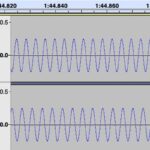Due to increased popularity in the last 15 years, a number of studies looking at the neurological effects of binaural beats have been undertaken.
The problem with alternative therapies such as this is that research funding is fairly difficult to procure, and funding is limited in comparison to that of research into pharmaceutical drugs.
Commercially, it makes sense to fund research that has the most potential to make money, rather than funding natural therapies that will be fairly inexpensive for people to use easy to access.
Thankfully, due to public interest and a number of health organizations showing an interest in this area, we are seeing an increase in studies taking place and witnessing some very encouraging results, particularly in the areas of anxiety, sleep, and relaxation in general.
The Study
This particular study took place in 2007, with the goal of assessing the psychologic and physiologic effects of binaural beats.
Carried out by the Helfgott Research Institute, National College of Natural Medicine, Portland, the study involved 8 healthy adults.
Each subject was given a CD containing delta (0-4 Hz) binaural beats to listen to daily for 60 days.
Data on psychologic and physiologic effects were collected before and after the 60-day intervention.
In terms of psychology the study measured anxiety, mood state, and quality of life; and physiologically the study looked at insulin, dopamine, melatonin, and blood pressure levels over the duration.
Study Restrictions
This is a small cohort study, and we must bear this in mind when considering the results. That being said, it is often much easier to track the results of a smaller group in an observational study like this.
The purpose of this study was to gather preliminary data on binaural beats therapy for hypothesis generation and to assess compliance, feasibility, and safety for future studies.
The Results
The results were positive and indeed interesting.
There was a decrease in trait anxiety (p = 0.004), an increase in quality of life (p = 0.03), and a decrease in insulin-like growth factor-1 (p = 0.01) and dopamine (p = 0.02) observed between pre- and postintervention measurements.
Binaural beat technology may exhibit positive effect on self-reported psychologic measures, especially anxiety. Further research is warranted to explore the effects on anxiety using a larger, randomized and controlled trial.
To understand these results, you will need to understand what the P values mean. Here's a quick explanation:
The p-value provides a percentage of the likelihood, based on statistical tests, of the study results.
For example: if a p-value is 0.01, there is a 1% likelihood that the result was due to chance and a 99% chance that it wasn't – and was due to the binaural beats.
The most common cut-off for p-values is 0.05. So if a p-value is 0.06, then it is considered not statistically significant. On the other hand, if a p-value is 0.04, then the result is statistically significant.
So we can see here that the results are statistically significant and most probably not down to chance.
Anxiety Reduction
The results showed a decrease in trait anxiety, an increase in quality of life, and a decrease in insulin-like growth factor and dopamine in all patients.
We know from other studies that binaural beats have an impact on reducing anxiety and stress related conditions (1, 2), so this was quite expected.
Quality of Life
The quality of life measurement is based on the World Health Organization definition. This would have been assessed via a questionnaire.
WHO defines Quality of Life as an individual's perception of their position in life in the context of the culture and value systems in which they live and in relation to their goals, expectations, standards and concerns. It is a broad ranging concept affected in a complex way by the person's physical health, psychological state, personal beliefs, social relationships and their relationship to salient features of their environment (3).
Decreased Dopamine
The reduction in dopamine complements the reduction in anxiety, and may indeed be the reason for the reduction in anxiety. We know that people with higher than normal levels of dopamine may experience anxiety, agitation, hyperactivity, and insomnia (4).
The study was conducted using Delta frequency binaural beats. Delta is associated with the dominant brainwaves released in the stages of deep sleep, so it make sense that there would be a reduction in dopamine to allow for deep relaxation/sleep (5). This suggests that the binaural beats were effective.
This is particularly positive because it demonstrates that Delta frequency binaural beats have the potential to help those with abnormally high levels of dopamine and subsequent feelings of agitation and anxiety, and potentially trouble sleeping due to insomnia.
Decreased IGF1
A decrease in Insulin-Like Growth Factor-1 is an interesting outcome because it is something that the medical community has been studying for a number of years in relation to cancer risk (6).
Insulin-like growth factor 1 (IGF-1) is a hormone similar in molecular structure to insulin which plays an important role in childhood growth, and has anabolic effects in adults (7)
High levels of IGF-1, notably shown to be promoted by high meat protein diets, are linked to certain cancers. So lowering IGF-1 could be beneficial for those at high risk (8).
In Summary
These are positive results that can certainly be used as hypotheses to design further studies.
However, there are larger, more reliable studies with many more participants and better controlled circumstances. We will be covering these studies and emerging research in other blog posts.
If you would like to see the official study on PubMed, you can find it here.









